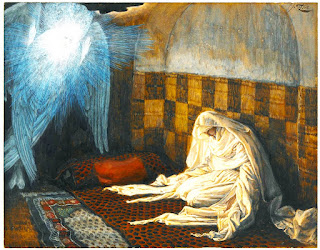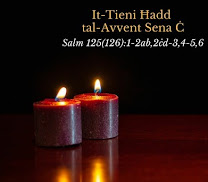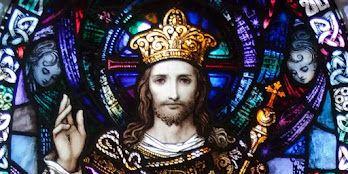Readings for Sunday, December 31, 2023
Lectionary: 17
- Il-Familja Mqaddsa
Reading 1 GENESIS 15:1-6; 21:1-3
The word of the LORD came to Abram in a vision, saying: “Fear not, Abram! I am your shield; I will make your reward very great.” But Abram said, “O Lord GOD, what good will your gifts be, if I keep on being childless and have as my heir the steward of my house, Eliezer?” Abram continued, “See, you have given me no offspring, and so one of my servants will be my heir.” Then the word of the LORD came to him: “No, that one shall not be your heir; your own issue shall be your heir.” The Lord took Abram outside and said, “Look up at the sky and count the stars, if you can. Just so,” he added, “shall your descendants be.” Abram put his faith in the LORD, who credited it to him as an act of righteousness. The LORD took note of Sarah as he had said he would; he did for her as he had promised. Sarah became pregnant and bore Abraham a son in his old age, at the set time that God had stated. Abraham gave the name Isaac to this son of his whom Sarah bore him.
QARI 1 mill-Ktieb ta’ Ġenesi 15, 1-6; 21, 1-3
F’dak iż-żmien, ġiet il-kelma tal-Mulej lil Abram f’dehra u qallu: “La tibżax, Abram! Jiena tarka għalik; ħlasek ikun kbir ħafna”. U Abram qallu: “Sidi Mulej, x’se tagħtini, għax se nibqa’ bla tfal, u l-werriet ta’ dari se jkun Eligħeżer ta’ Damasku”. U Abram żied jgħid: “Ara, int lili ma tajtnix nisel, u qaddej dari se jiritni”. U ara, waslitlu l-kelma tal-Mulej u qallu: “Ma jirtekx dan, imma wieħed ħiereġ mill-ġewwieni tiegħek, hu għad jirtek”. U ħarġu barra u qallu: “Ħares sewwa lejn is-smewwiet u għodd il-kwiekeb, jekk għandek ħila tgħoddhom”. U żied jgħidlu: “Hekk għad ikun nislek”. U hu emmen fil-Mulej, u dan għaddhulu b’ġustizzja. U l-Mulej żar lil Sara bħalma kien qalilha, u għamel magħha dak li kien wegħedha. U Sara tqalet u wildet iben lil Abraham fi xjuħitu, fiż-żmien li kien qallu Alla. U Abraham semma ’l ibnu li twelidlu, li kienet wilditlu Sara, Iżakk. Il-Kelma tal-Mulej
Responsorial Psalm PSALM 105:1-2, 3-4, 5-6, 8-9
make known among the nations his deeds.
Sing to him, sing his praise,
proclaim all his wondrous deeds.
R. The Lord remembers his covenant for ever.
Glory in his holy name;
rejoice, O hearts that seek the LORD!
Look to the LORD in his strength;
constantly seek his face.
R. The Lord remembers his covenant for ever.
You descendants of Abraham, his servants,
sons of Jacob, his chosen ones!
He, the LORD, is our God;
throughout the earth his judgments prevail.
R. The Lord remembers his covenant for ever.
He remembers forever his covenant
which he made binding for a thousand generations
which he entered into with Abraham
and by his oath to Isaac.
R. The Lord remembers his covenant for ever.
SALM RESPONSORJALI Salm 104 (105), 1b-2.3-4.5-6.8-9
R/. (7a.8a): Jaħweh hu Alla tagħna! Jiftakar għal dejjem fil-patt tiegħu
Faħħru l-Mulej u xandru ismu,
għarrfu lill-ġnus bl-għemejjel tiegħu.
Għannulu u doqqulu,
xandru l-għeġubijiet tiegħu kollha. R/.
Ftaħru bl-isem qaddis tiegħu;
tifraħ il-qalb ta’ dawk li jfittxu l-Mulej.
Ħabirku biex tagħrfu l-Mulej u l-qawwa tiegħu,
fittxu ’l wiċċu l-ħin kollu. R/.
Ftakru fil-ħwejjeġ kbar li għamel,
fl-għeġubijiet u l-ġudizzji tiegħu.
Nisel Abraham, il-qaddej tiegħu,
ulied Ġakobb, il-maħtur tiegħu. R/.
Jiftakar għal dejjem fil-patt tiegħu,
fil-kelma li ta għal elf nisel,
fil-patt li għamel ma’ Abraham,
fil-wegħda li ħalef lil Iżakk. R/.
Reading 2 HEBREWS 11:8, 11-12, 17-19
Brothers and sisters: By faith Abraham obeyed when he was called to go out to a place that he was to receive as an inheritance; he went out, not knowing where he was to go. By faith he received power to generate, even though he was past the normal age --and Sarah herself was sterile-- for he thought that the one who had made the promise was trustworthy. So it was that there came forth from one man, himself as good as dead, descendants as numerous as the stars in the sky and as countless as the sands on the seashore. By faith Abraham, when put to the test, offered up Isaac, and he who had received the promises was ready to offer his only son, of whom it was said, “Through Isaac descendants shall bear your name.” He reasoned that God was able to raise even from the dead, and he received Isaac back as a symbol.
QARI 2 mill-Ittra lil-Lhud 11, 8.11-12.17-19
Ħuti, kienet il-fidi li ġagħlet lil Abraham jobdi s-sejħa ta’ Alla, meta dan qallu biex imur f’art li kien se jagħtih b’wirt; u telaq, bla ma kien jaf fejn kien sejjer. Kienet ukoll il-fidi li biha Sarah, mara mdaħħla fiż-żmien, setgħet titqal, għax hija għarfet li ta’ kelmtu kien dak li għamlilha l-wegħda. Kien għalhekk li minn bniedem wieħed, li kien tista’ tgħid mejjet, twieldu nies bil-kotra daqs il-kwiekeb tas-sema u daqs ir-ramel ta’ xatt il-baħar, li ħadd ma jista’ jgħoddu. Kienet il-fidi li ġagħlet lil Abraham joffri ’l Iżakk meta Alla ġarrbu; u kien se joffri lil ibnu l-waħdieni sewwasew dak li kien ħa l-wegħdiet, hu li Alla kien qallu: “Minn Iżakk int għad ikollok nisel”. Huwa fehem li Alla kellu s-setgħa saħansitra li jqajjem mill-mewt; u, fis-sens ta’ tixbiha, ħadu tabilħaqq lura mill-mewt.
Gospel LUKE 2:22-40
When the days were completed for their purification according to the law of Moses, They took him up to Jerusalem to present him to the Lord, just as it is written in the law of the Lord, Every male that opens the womb shall be consecrated to the Lord, and to offer the sacrifice of a pair of turtledoves or two young pigeons, in accordance with the dictate in the law of the Lord. Now there was a man in Jerusalem whose name was Simeon. This man was righteous and devout, awaiting the consolation of Israel, and the Holy Spirit was upon him. It had been revealed to him by the Holy Spirit that he should not see death before he had seen the Christ of the Lord. He came in the Spirit into the temple; and when the parents brought in the child Jesus to perform the custom of the law in regard to him, He took him into his arms and blessed God, saying: “Now, Master, you may let your servant go in peace, according to your word, for my eyes have seen your salvation, which you prepared in sight of all the peoples, a light for revelation to the Gentiles, and glory for your people Israel.” The child’s father and mother were amazed at what was said about him; and Simeon blessed them and said to Mary his mother, “Behold, this child is destined for the fall and rise of many in Israel, and to be a sign that will be contradicted —and you yourself a sword will pierce— so that the thoughts of many hearts may be revealed.” There was also a prophetess, Anna, the daughter of Phanuel, of the tribe of Asher. She was advanced in years, having lived seven years with her husband after her marriage, and then as a widow until she was eighty-four. She never left the temple, but worshiped night and day with fasting and prayer. And coming forward at that very time, she gave thanks to God and spoke about the child to all who were awaiting the redemption of Jerusalem. When they had fulfilled all the prescriptions of the law of the Lord, they returned to Galilee, to their own town of Nazareth. The child grew and became strong, filled with wisdom; and the favour of God was upon him.
EVANĠELJU Qari skont San Luqa 2, 22-40
Wara li għalqilhom iż-żmien għall-purifikazzjoni tagħhom skont il-Liġi ta’ Mosè, Marija u Ġużeppi ħadu lil Ġesù Ġerusalemm biex jippreżentawh lill-Mulej, kif hemm miktub fil-Liġi tal-Mulej: “Kull tifel li jitwieled l-ewwel, jiġi kkonsagrat lill-Mulej” – u biex joffru b’sagrifiċċju par gamiem jew żewġ bċieċen, kif jingħad ukoll fil-Liġi tal-Mulej. F’Ġerusalemm kien hemm wieħed, jismu Xmun, raġel ġust u tajjeb, li kien jistenna l-faraġ ta’ Iżrael u li kellu l-Ispirtu s-Santu fuqu. L-Ispirtu s-Santu kien nebbħu li ma kienx se jara l-mewt qabel ma jara l-Messija tal-Mulej. Mar mela fit-tempju, imqanqal mill-Ispirtu, u xħin il-ġenituri daħlu bit-tarbija Ġesù biex jagħmlulu dak li kienet trid il-Liġi, huwa laqgħu fuq dirgħajh, bierek lil Alla u qal: “Issa, o Sid, tista’ tħalli l-qaddej tiegħek imur fis-sliem, skont kelmtek, għaliex għajnejja raw is-salvazzjoni tiegħek li int ħejjejt għall-popli kollha, dawl biex idawwal il-ġnus, u glorja tal-polpu tiegħek Iżrael”. Missieru u ommu baqgħu mistagħġba b’dak li kien qiegħed jingħad fuqu. Xmun berikhom, u qal lil ommu Marija: “Ara, dan se jġib il-waqgħa u l-qawmien ta’ ħafna f’Iżrael; se jkun sinjal li jmeruh, – u inti wkoll, sejf jinfidlek ruħek! – biex jinkixfu l-ħsibijiet moħbija fil-qlub ta’ ħafna”. Kien hemm ukoll waħda profetissa, Anna, bint Fanwel, mit-tribù ta’ Aser. Kienet imdaħħla ħafna fiż-żmien; wara xbubitha kienet għamlet seba’ snin miżżewġa, u mbagħad romlot. Sa ma kellha erbgħa u tmenin sena ma kienet titwarrab qatt mit-tempju, lejl u nhar taqdi lil Alla fis-sawm u t-talb. Dak il-ħin stess waslet, u bdiet trodd ħajr lil Alla u titkellem fuq it-tarbija ma’ dawk kollha li kienu jistennew il-fidwa ta’ Ġerusalemm. Meta temmew kull ma kellhom jagħmlu skont il-Liġi tal-Mulej reġgħu lura lejn il-Galilija fil-belt tagħhom ta’ Nazaret. U t-tifel baqa’ jikber u jissaħħaħ, mimli bl-għerf. U l-grazzja ta’ Alla kienet fuqu. Il-Kelma tal-Mulej.
////////////////////////////////////
Eight-minute Homily by Fr Tony Kadavil
Introduction:
On the last Sunday of the year, we celebrate the Feast of the Holy Family. We are here to offer all the members of our own families on the altar for God’s blessing.
Scripture lessons summarized:
The first reading (Gen 15:1-6, 21: 1-3) Today we hear God’s promise (Chapter 15), of numerous descendants to Abraham whom Judaism, Christianity, Islam consider their father, and its fulfilment (Chapter 21) when Abraham’s wife, Sarah, gave birth to Isaac.
In the second reading, (Hebrews 11:8, 11-12, 17-19)taken from the letter to the Hebrews, the sacred author further shows us the trusting faith of Abraham in the promises of God, first, in Abraham’s willingness to move his whole family to an unknown place to which God said He would lead him; second, in the way Abraham and Sarah trusted God’s power to give them a son born to them in their very old age and third, in the way Abraham’s unwavering Faith in his God enabled him to obey, without hesitation, his God’s order to sacrifice his only son.
Today’s Gospel (Lk 2:22-40) presents the head of the Holy Family, Joseph, faithfully obeying God’s law given through Moses concerning the purification of the mother and the redeeming of the child by presenting Mary and the Baby Jesus in the Temple. The events recounted here are also found on February 2nd, the Feast of Presentation of Jesus.
Life messages:
1) We need to learn lessons from the Holy Family: The Church encourages us to look to the Family of Jesus, Mary and Joseph for inspiration, example and encouragement. They were a model family in which both parents worked hard, helped each other, understood and accepted each other, and took good care of their Child so that Jesus might grow up not only in human knowledge but also as a Child of God.
2) We need to make the family a confessional rather than a courtroom. A senior Judge of the Supreme Court congratulated the bride and groom in a marriage with a pertinent piece of advice: “See that you never convert your family into a courtroom; instead let it be a confessional. If the husband and wife start arguing like attorneys in an attempt to justify their behavior, their family becomes a court of law and nobody wins. On the other hand, if the husband and the wife — as in a confessional — are ready to admit their faults and try to correct them, the family becomes a heavenly one.”
3) Marriage is a sacrament of holiness. Each family is called to holiness. By the Sacrament of Matrimony (marriage), Jesus sanctifies not only the spouses but also the entire family. The husband and wife attain holiness when they discharge their duties faithfully, trusting in God, and drawing on the power of God by prayer.
////////////////////////////////////// © https://frtonyshomilies.com





.jpg)
.jpg)







.jpg)